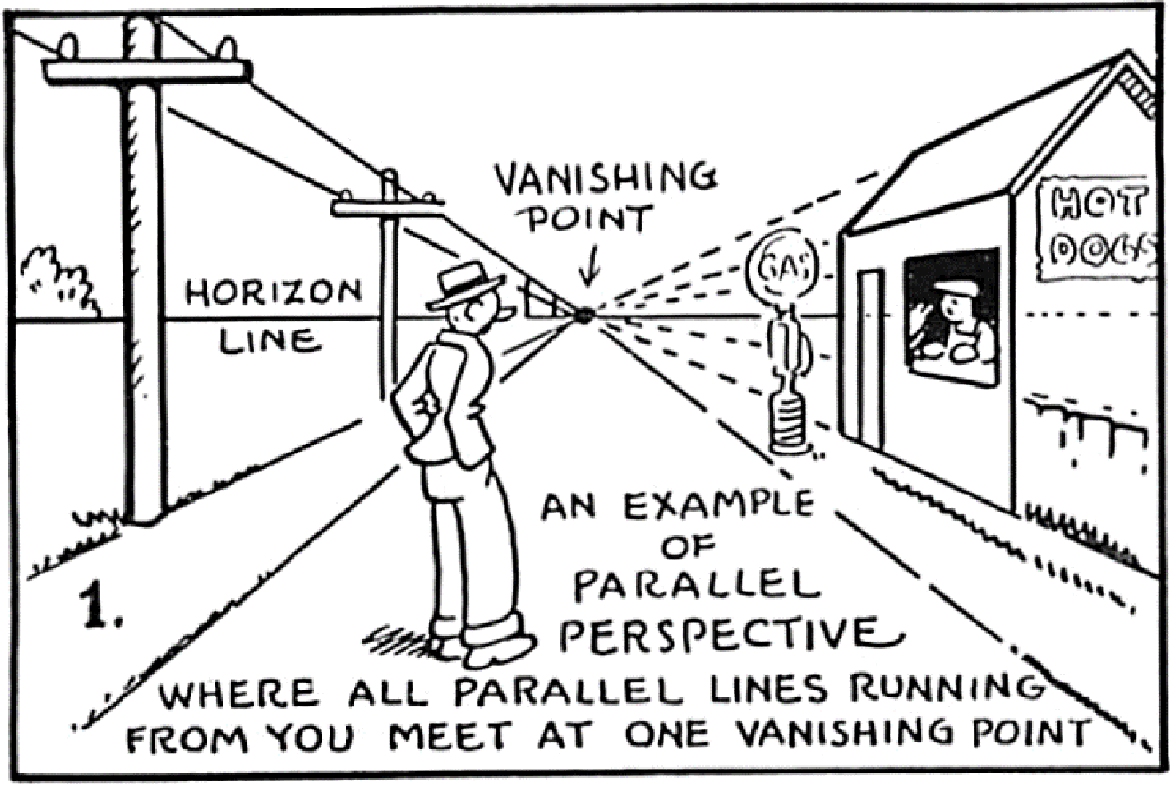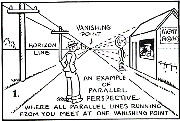Perspective and Parkinson's
It was magic.
I failed finger-painting in kindergarten. In first grade, my yellow sun (stuck up in the corner of the page) illuminated a distorted box purported to be our house and stick figures representing family and pets. The front door and windows were misshapen rectangles — maybe even trapezoids. The cat ended up with a forked tail. As sibling rivalry reared its ugly head, I deliberately drew my brother with only one arm and one leg.
In second grade, my drawings of flowers were simply blobs of color with no relationship to reality. This inability to draw, to represent reality on paper or canvas, was a source of frustration and embarrassment to this seven-year-old. By fourth grade, I was an art school dropout. That was not magic, it was disappointment.
Magic arrived in the form of the vanishing point — where parallel lines recede into the distance. Suddenly, I could draw buildings and street scenes that looked more realistic. The world tapered off into the distance. Closer objects were larger — further away, smaller. Using a ruler, I could draw straight lines and elements in the drawing became recognizable. It was still not art, but I was satisfied. It’s all about perspective.
Perspective is a wonderful word. It has a least three primary meanings, but all relate to looking or seeing. In the previous paragraph, perspective can mean the direction or angle we see things or our point of view. Further, our point of view can also mean two things. Literally, it is where we stand in relation to our environment. Figuratively, it alludes to how we choose to see, to interpret and to make judgments about the world. Roget (of thesaurus fame) would suggest outlook, vantage point and viewpoint as synonyms for perspective.
Regular readers of this column know I am supposed to reflect on my journey with Parkinson’s disease. So what does this have to do with PD? First a quick refresher: PD is a progressive neurodegenerative disease (thousands of brain cells are already dead or dying!) with unknown causes and no cure. The results are motor symptoms (like tremor and freezing of gait) and non-motor symptoms (like soft voice, depression, loss of smell and sleep disorders).
Abraham Lincoln was a great president, but he never said many of the things attributed to him. One of my favorite sayings (by Alphonse Karr — not Lincoln): “We can complain because rose bushes have thorns or rejoice because thorn bushes have roses.” It is all a matter of your perspective. Vivian Green expressed the concept using different words: “Life isn’t about waiting for the storm to pass, it’s about learning to dance in the rain.”
Parkinson’s disease sucks. There is no cure, and it is progressive. It is going to get worse. Yet, a common metaphor used to describe PD is “gift.” Gift? Having a condition that chips away at your quality of life and ability to move is a gift? You’re crazy.
Indeed, I may be crazy, but from my perspective (and I’m the one with Parkinson’s) it is a gift. That does not mean I think people should line up and ask for PD. Instead, I choose to acknowledge Parkinson’s has enriched my life in many ways. Appreciation and gratitude have taken on a richer, more emphatic meaning with this perspective.
The easiest example of this is travel. As a result of working with the Parkinson’s community, my wife and I have traveled to New York and Washington (both new to Pamela), Colorado Springs, and Miami. Of course, we can’t forget Kyoto, Japan in 2019 for the World Parkinson Congress!
I’ve been able to visit the National Institutes of Health, Columbia University, Oregon Health and Sciences University (OHSU) to participate in research. I have visited the National Primate lab at Emory University. I have reviewed research grant proposals for the Department of Defense. I’ve hiked over 125 miles of the Pacific Crest Trail. None of these opportunities would have come my way without Parkinson’s. Yes, PD is a gift.
As a former teacher and principal, Parkinson’s has given me the chance to continue to try to make a difference. I participate on councils, advocate for funding, work with support groups, write my column, promote the World Parkinson Congress (Barcelona, Spain in 2022) and present at conferences. Parkinson’s has kept me busy in my retirement years — much to Pamela’s relief! PD is a gift for her as well.
More important than seeing new places, learning new things, and working in new ways, has been the opportunity to make new friends and join a community of incredible people: ParkyWorld. Some of these folks are fierce Parkinson’s warriors and advocates, some are quietly and almost invisibly working behind the scenes as researchers, others are providing support and encouragement as we fight to maintain and improve our quality of life. What we all share is a determination to make a difference and to help beat Parkinson’s. Whether we participate in clinical trials, support our foundations with money, lobby Congress to provide funds for research or share tips for living better with PD, we know we can count on each other. That, my friends, is truly priceless. People with Parkinson’s may not have the choice of having it miraculously disappear, but we can choose our point of view. We can choose our perspective.



